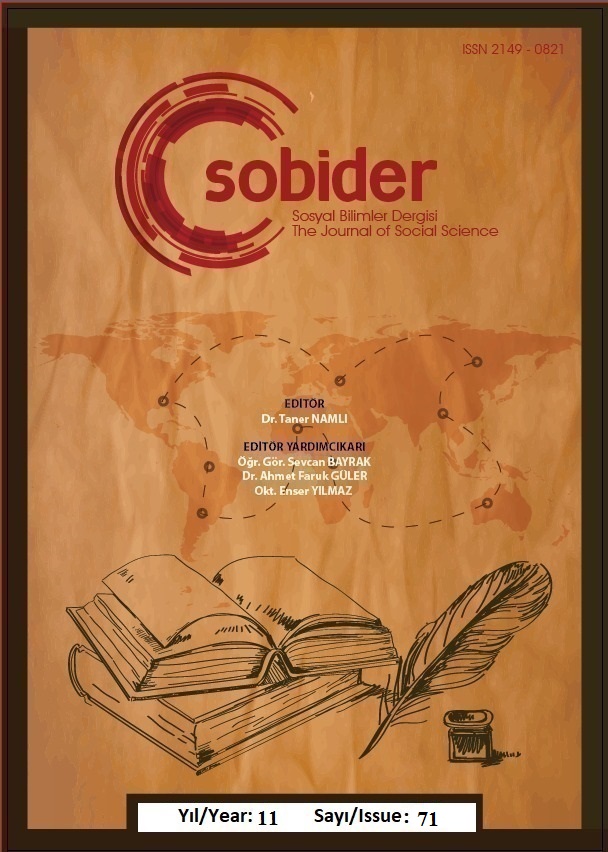TÜRKİYE YÜZYILI MAARİF MODELİNDE BAHSEDİLEN ÖĞRENCİ PROFİLİ “YETKİN VE ERDEMLİ İNSAN”A ULAŞMANIN YOLU
Author :
Abstract
Eserin temelde ortaya çıkışı Türkiye Yüzyılı Maarif Modelinde vurgulanan yetkin ve erdemli insan betimlemesini irdelemektir. Geçmişten günümüze erdem ve ahlak odağında eğitim konusuna genel bir bakış temasıyla Antik Yunandan günümüze önemli düşünürlerin ahlak, etik ve eğitimle alakalı görüşleri incelenmiştir. 2024-2025 Eğitim Öğretim yılından itibaren kademli olarak tüm yurtta uygulanmaya başlayacak olan yeni programla yetiştirilmesi istenen öğrenci profili açıkça tanımlanmıştır. Öğrencinin erdem ve yetkinlik konusunda hangi özelliklere sahip olması gerektiğinin vurgulandığı programın merkezinde “insan” olduğu görülmüştür. İlk düşünürlerin ortaya çıktığı Antik Yunan’dan bugüne erdem konusu tüm düşünürlerin ilgi odağıdır. Bundan hareketle çalışmada Sofistler, Sokrates, Platon ve Aristotelesin yer aldığı İlkçağlardan günümüze ahlak ve erdem odağında eğitim konusuyla alakalı görüşler derlenmiştir. John Locke, John Dewey, Pestalozzi, Kohlberg gibi dünyaca ünlü düşünürlerin eğitim görüşleri araştırmada yer almıştır. Türkiye yüzyılı maarif modeli öğretim programından öğrenci profiline ilişkin şemalar alınmış ve makaleye yerleştirilmiştir. Çalışma sonuç kısmıyla sonlandırılmıştır. Salt bilgi değil bilginin yanında ahlak ve erdemi de öğrencinin kişiliğine yerleştirmeyi amaçlayan Türkiye Yüzyılı Maarif Modeli öğretim programına göre öğrenci hem bireysel hem de toplumsal açıdan kendini en iyi şekilde donatmakla mükelleftir. Ahlaki değer yargıları ile en üst seviyeye çıkarılması hedeflenen öğrencilerin Türk toplumunu her açıdan en üst seviyeye çıkarması hedeflenmektedir. Bu modele göre yetişen öğrencilerin ileriki dönemlerde topluma olan katkısının da hangi seviyede olacağı görülecektir. Öğretim programları ders bazlı değerlendirmelere tabi tutulacağı gibi bir önceki programla farklılık-benzerlikleri açısından da incelenebilir. Özellikle Türkçe ilkokuma yazma programına göre değiştirilen harf gruplarına bağlı olarak sürecin işleyişine ilişkin çalışmalar yapılabilir. Araştırmacılara ve öğretmenlere örnek konu işleyişleri ders bazında yayınlanabilir.
Keywords
Abstract
The basic origin of the work is to examine the depiction of competent and virtuous people emphasized in the Turkish Century Education Model. With the theme of a general overview of education focusing on virtue and morality from past to present, the views of important thinkers from Ancient Greece to the present regarding morality, ethics and education were examined. The student profile to be trained with the new program, which will be gradually implemented throughout the dormitory starting from the 2024-2025 academic year, has been clearly defined. It has been observed that "human" is at the center of the program, which emphasizes what characteristics the student should have in terms of virtue and competence. The subject of virtue has been the focus of attention of all thinkers since Ancient Greece, where the first thinkers emerged, until today. Based on this, in this study, the views on education, focusing on morality and virtue, from the Antiquity to the present day, including the Sophists, Socrates, Plato and Aristotle, have been compiled. The educational views of world-famous thinkers such as John Locke, John Dewey, Pestalozzi and Kohlberg were included in the research. Diagrams regarding the student profile were taken from the Turkish century education model curriculum and placed in the article. The study ended with the conclusion part. According to the Turkish Century Education Model curriculum, which aims to embed not only knowledge but also morality and virtue in the student's personality, the student is obliged to equip himself in the best possible way both individually and socially. It is aimed that the students, who are aimed to raise their moral value judgments to the highest level, will raise the Turkish society to the highest level in every aspect. It remains to be seen to what extent the students trained according to this model will contribute to society in the future. Curriculum programs can be evaluated on a course-based basis as well as examined in terms of differences and similarities with the previous program. Studies can be conducted on the functioning of the process, especially depending on the letter groups changed according to the Turkish primary literacy program. Sample subject treatments can be published on a course basis for researchers and teachers.





